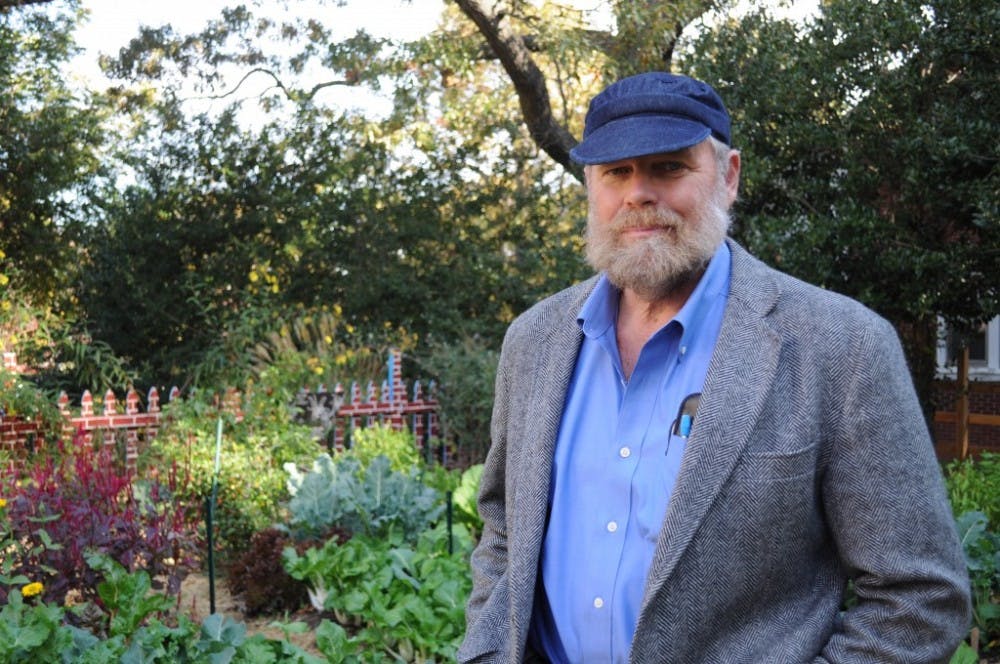Steve Moore likes being close to the earth.
That’s why Moore, a lecturer of environmental studies at Elon University, teaches agroecology. But there’s more to his environmental awareness than his teaching position. Moore owned and operated a 12-acre farm in Pennsylvania for more than 35 years, and his hands-on farming techniques allowed him to get as close to the earth as possible.
“Some farmers enjoy sitting up on a tractor, but that’s not me,” he said. “I like working with my hands.”
Moore was acclimated to agricultural life as a child because his father and grandfather were avid gardeners. After he graduated from Gettysburg College, Moore began working for the U.S. National Park Service. He married his wife, Carol, in 1974, and that same year, the newlyweds gathered up enough money to purchase their own farm in Fairfield, Pa.
Moore said their decision was based off a mutual interest in agricultural production as well as current national trends.
“It was just the beginnings of the environmental movement in the early 1970s,” he said. “Food raising was becoming a big deal. With my interest in farming and me and my wife’s desire to have a farming lifestyle to raise a family in, all these factors converged into a career.”
During their time on the farm, Moore produced fruits and vegetables and worked with livestock, and the entire family, including his wife Carol and their five children, helped with the workload.
“It was a constantly busy time,” Carol said. “The children learned very early on how to work. Altogether, it was a real feeling of family unity and working toward a cause.”
Moore particularly enjoyed working with horses on the farm. Several other, larger farms surrounded their property, so Moore frequently helped one of his neighbors by riding the neighbor’s tractor but using Moore’s horses to rake hay for him.
With the tractor’s fast-disk mower, it was common to hit animals while in the fields, but Moore said his horse Queenie would help prevent this by turning her head and ears and shying away from where they were cutting to show that there was an animal in their path.
“I would stop and there was always something there, like a fawn or a turtle, so I’d move it and we would go on without having to run over it,” Moore said. “That was neat to see the differences in man’s approach to the natural world. One way is to run over it as fast as you can, and the other is an integrated approach.”
But the family had its fair share of chaotic moments — Carol and her husband frequently joke that whenever Moore had to travel on business and Carol was left by herself, something always went wrong. Once, a horse broke out from its stable and ended up at a nursing home across from the river that bordered their farm.
“There were police cars and sirens and everything,” Carol said. “Our daughter was two at the time, so I told her to wait at home while I swam the horse back over the river. She still remembers that to this day.”
After using horses for large-scale food production, Moore began using practices geared toward using less energy, so he and Carol focused on biointensive techniques to farm. This means the majority of the work was done by hand, so they downsized the farm to have a smaller work area.
“First, people thought we were crazy for farming with horses, and then they thought we were crazy for farming by hand,” he said. “We could attain a much higher degree of sustainability if we could grow more food in a way smaller area and do a much better job.”
Despite his love of farming, Moore’s academic career continued to progress over the years, so he struggled to balance teaching and research with food production. He and Carol eventually sold their farm to one of their sons in 2001 and they moved to North Carolina after Moore accepted a research position at North Carolina State University.
But Moore’s agriculture days definitely aren’t over. Since he began teaching at Elon, Moore moved to a house a few miles from campus with Carol and their daughter and started up a small greenhouse and vegetable garden. He applies his experience to his classes at Elon by emphasizing the importance of sustainable food production.
“I know people I teach probably won’t become farmers,” he said. “But I believe that one of the defining factors in our world is food access. I want students to know the theories for growing food so they at least have an appreciation for it.”
In the meantime, Moore is content with his garden at home, but hasn’t lost his passion for running a fully productive farm.
“I can see a time when I maybe retire from non-profit and academic work and just go back to my son’s farm,” he said. “I would enjoy that.”


